DfE Manage Free School Projects - Discovery and Alpha
Clients
Department for Education, UKEmployer
dxwRole in project
Lead Interaction DesignerActivities and tools
Prototyping Interaction design GOV.UK Design System GOV.UK protoyping kit LucidsparkYear
2023Developing a reliable data system for free schools in the UK
The Department for Education (DfE) engaged us to transform the Free Schools Store (FSS), an ageing data system critical for managing free school projects across the UK.
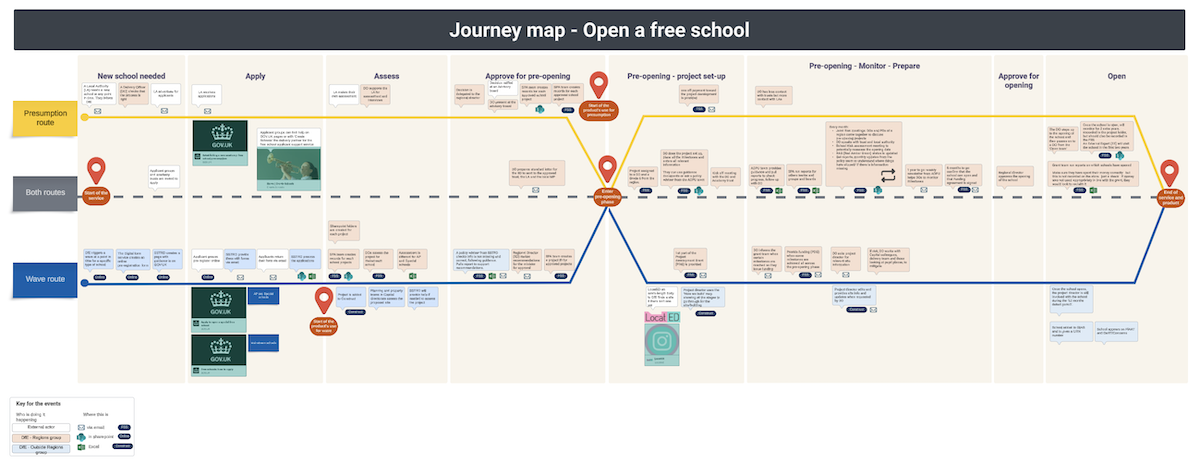
Journey mapping - open a free school
Discovery Phase: Understanding User Needs and System Challenges
The FSS served as a data repository, providing stakeholders with essential information on school capacity, funding, and project status. However, its outdated structure led to usability, data quality, and accessibility issues that hindered reliable data entry and reporting.
Background and objectives
Initially designed to support DfE’s free school programme, FSS had grown inefficient over time, with users often bypassing it in favour of external records. Key objectives for the Discovery phase included:
- Identifying user needs and pain points through comprehensive research
- Addressing system challenges to improve data accuracy, usability, and accessibility
- Defining a plan to modernise FSS and align it with current standards
User research and key findings
Through interviews with 108 active users, we gained insights into FSS’s shortcomings:
- Data entry complexity: Users struggled with an overload of fields, many irrelevant to their specific tasks. This led to inefficiency and inconsistencies.
- Navigation and usability: Lacking a modern interface, FSS posed navigation challenges, particularly for users with accessibility needs. Its fixed structure made it challenging to use on various devices.
- Data quality concerns: FSS’s lack of field validation resulted in frequent data entry errors, compromising reliability and data trust.
- Low confidence and utility: Given these issues, users often relied on alternative data sources, leading to inefficiencies and redundant data storage.
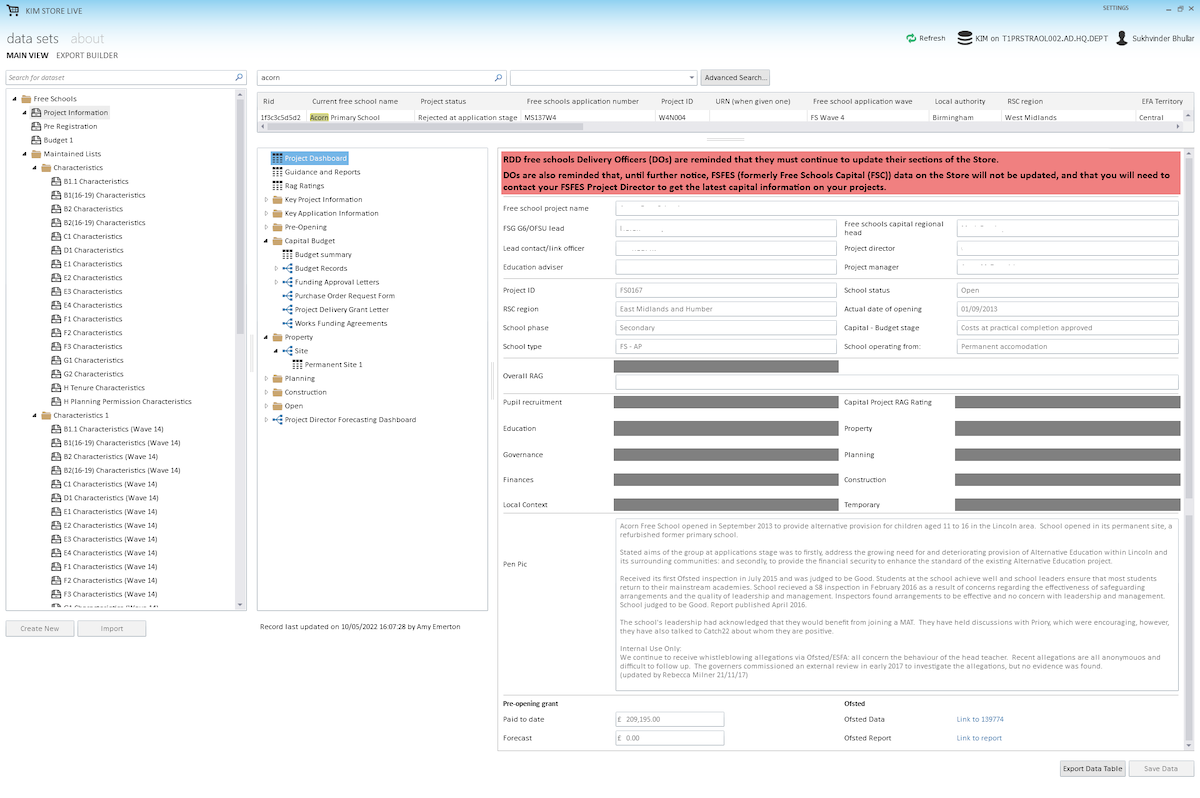
Screenshot of the legacy system Free Schools Store
Challenges and constraints
The system’s outdated codebase limited incremental improvements, necessitating a comprehensive overhaul. Additionally, FSS did not meet current accessibility standards, and a full rework was needed to ensure compliance.
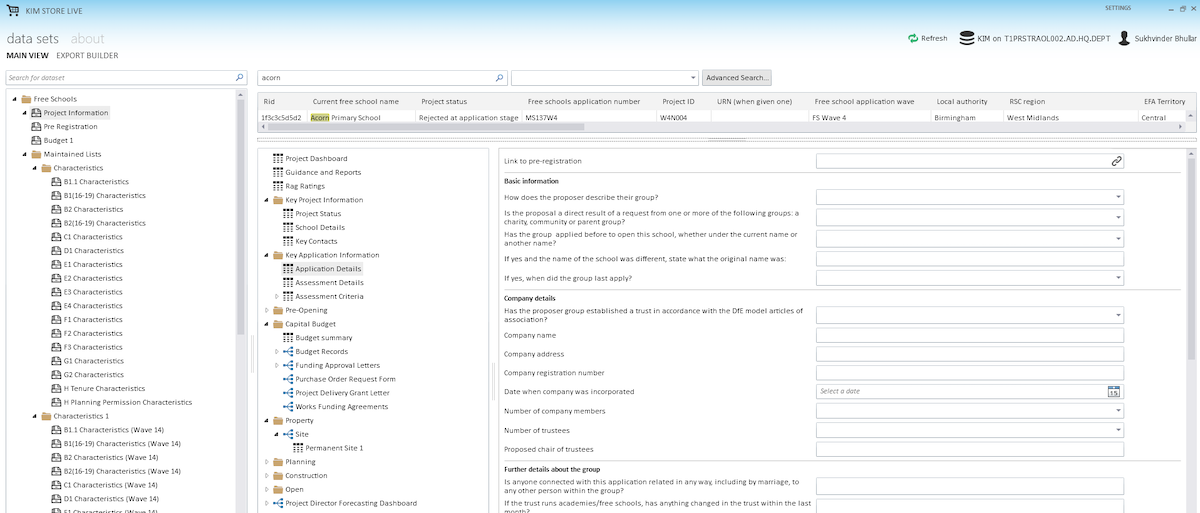
Screenshot of the legacy system Free Schools Store
Discovery recommendation and alpha phase goals
Our recommendation was to develop a user-centred replacement for FSS with a focus on usability, accessibility, and data reliability. Key goals for the Alpha phase included:
- Data entry complexity: Users struggled with an overload of fields, many irrelevant to their specific tasks. This led to inefficiency and inconsistencies.
- Redesigning the interface: to support fast, accurate data entry with intuitive navigation
- Improving data quality: through validation and error-checking mechanisms
- Ensuring accessibility: by adhering to GDS and DfE standards, creating a system accessible to all users
- Engaging stakeholders: to ensure continuous feedback throughout the design process
With a clear roadmap, the Alpha phase would address high-priority issues first, establishing a foundation for the eventual system rollout.
Alpha phase: building and validating a modernised system
Building on the Discovery phase insights, the Alpha phase focused on validating key hypotheses and developing user-centred prototypes. This phase laid the groundwork for creating Manage Free School Projects (MFSP), a streamlined, accessible replacement for FSS that better supports DfE’s data management needs.
Objectives and approach
The Alpha phase aimed to address the key challenges identified in Discovery through targeted improvements:
- Simplified data entry and navigation:: By refining input fields and enhancing workflows, we reduced complexity for users.
- Enhanced accessibility: Adhering to GDS standards, we prioritised inclusivity, ensuring usability for users with diverse needs.
- Improved data quality: By integrating validation mechanisms, we enhanced data accuracy and built user confidence.
Key activities and findings
1. User research and workflow design
- Stakeholder collaboration:: Working with DfE stakeholders, including delivery officers and policy advisers, we mapped out the full project workflow. This helped us identify critical data points and streamline areas to support efficient data entry and reporting.
- Prototype testing: We developed and tested three prototype versions, each focusing on simplifying data input and enhancing information retrieval. User feedback guided improvements to filtering, search functions, and task tracking.
- Guided data-entry system: To minimise user errors, we introduced a guided entry process, adapting fields based on project type and user needs.
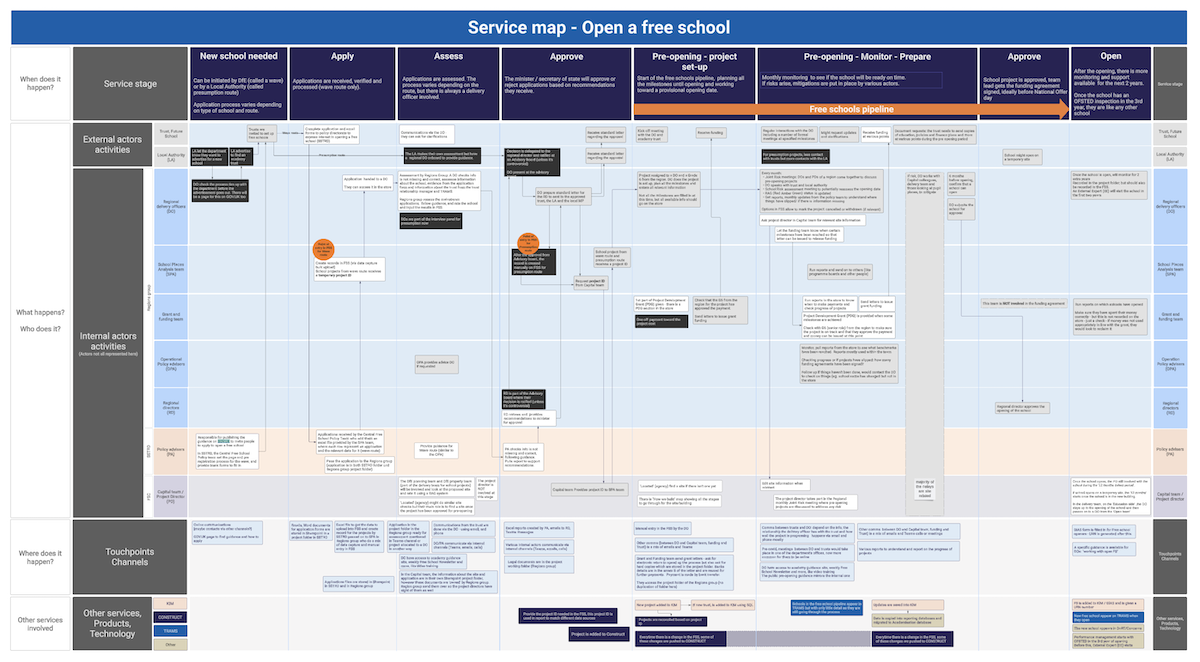
Service map
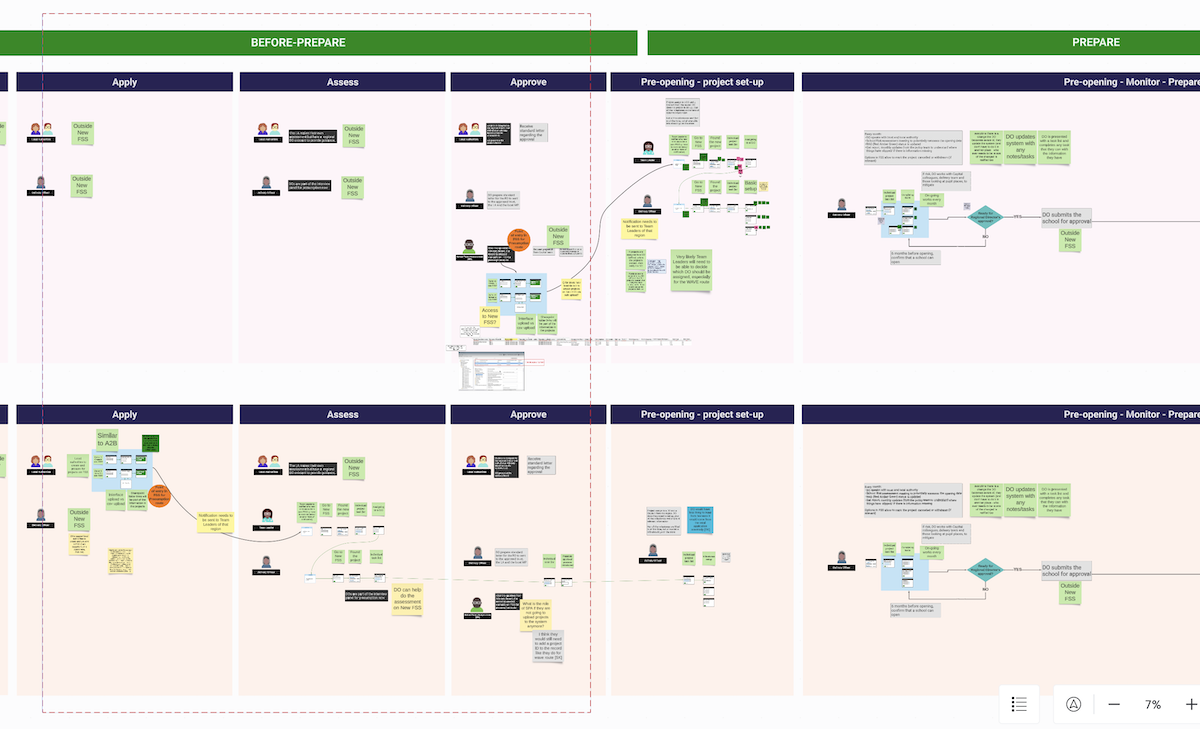
The focus area for prototyping

Prototype of the create project journey
2. Accessibility and inclusive design
- Standards compliance:: Following GDS guidelines, we conducted partial accessibility audits and made adjustments for readability, spacing, and font size.
- Cognitive walkthroughs: We created user profiles representing different accessibility needs and conducted walkthroughs, helping us identify and address issues with layout, text clarity, and button accessibility.
3. Refining field and data requirements for the MVP
- Data field reduction:: By analysing existing fields, we reduced redundancies and focused on core data needs, ensuring efficient, accurate entry.
- Data validation mechanisms: Automated checks and validation prompts helped improve data accuracy, reducing the need for back-end corrections.
4. Technical prototyping and sustainability
- Backend development:: Using C# .NET and Azure, we built a prototype compatible with DfE’s infrastructure and tested data migration for a smooth transition.
- Sustainable development: Optimising server usage, reducing data duplication, and considering green hosting options aligned MFSP with DfE’s sustainability goals.
Outcomes and next steps
The Alpha phase demonstrated the feasibility of a modernised FSS replacement with improved workflows, accessibility, and data management. User feedback confirmed that our design addressed key pain points while boosting data accuracy and user trust.
With this foundation, the upcoming Beta phase will involve:
- MVP refinement:: Incorporating feedback from Alpha and optimising system performance
- Private beta testing: Gathering additional user feedback to fine-tune functionality and design
- Comprehensive accessibility testing: Conducting detailed reviews to meet WCAG 2.1 level AA standards
- System expansion and integration: Adding features to further reduce manual processes and reliance on legacy systems
The Alpha phase validated our design and technical approaches, setting a clear path for transitioning from FSS to MFSP. This new system will enhance data quality, streamline reporting, and support efficient project management for free school initiatives across DfE.
